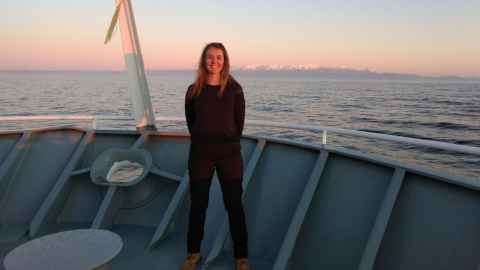Take 10 with... Sally Watson
Dr Sally Watson from the Institute of Marine Science discusses her research into understanding the dynamics of offshore geological processes over a range of time-scales from the continental shelf to the deep-ocean.

1. Describe your research topic to us in 10 words or less.
I research geological processes that happen in the ocean.
2. Now explain it in everyday terms!
I basically study the ocean floor. I investigate why it looks the way it does, what it’s made of, how it formed, and what sort of processes change it over time (things like volcanoes, earthquakes, ocean currents, and even human activities).
I use a range of techniques to help me understand what’s going on, including using sound to map the seabed (also known as SONAR) as well as the layers of sediment and rock buried below the surface. I also take samples of the sediments and rocks on the bottom of the ocean, to see what the seafloor is made of.
3. Describe some of your day-to-day research activities.
My day-to-day can change a lot. Sometimes I am in the office analysing datasets and writing papers, and other days I can be out in the field collecting new data, or in the lab processing samples. I work 20% with the University of Auckland and 80% with NIWA, in Wellington, so I’m often travelling between places to work with different people.
My fieldwork mainly consists of going on ships and boats to map the ocean floor or collected rock and sediment samples. Sometimes I go out for one day (usually when we work in coastal areas), but I also go out on big research vessels, which stay out for several weeks at a time and can go to very remote locations.
4. What do you enjoy most about your research?
One of the coolest things about my job is how much there is to explore. When we go out on fieldwork, sometimes it’s the first time anyone has mapped or sampled a region before. For example, in 2021 I went out to the Taranaki shelf, northwest of New Plymouth with some colleagues and we mapped a huge portion of the seafloor that had never been mapped before. On this voyage, we discovered a new underwater canyon system that extends from the shelf break at about 200 m water depth, all the way to 1,500 m of water.
I feel very privileged to be able to be a part of the cohort of scientists who are working together to map the global ocean.
5. Tell us something that has surprised or amused you in the course of your research.
Just how little we know about our own backyard. The ocean holds some of the biggest mountain ranges, valleys and such a vast array of unusual deep-sea environments. There is so much to learn and study in the oceans, and most of it is unmapped.
6. How have you approached any challenges you’ve faced in your research?
I have been lucky to find myself working with a wonderful and supportive bunch of people. As with all jobs, there can be range challenges in research. But working with great people has made the good times great and has really helped me push through the tougher times. I came for the science, but I stay for the people.
7. What questions have emerged as a result?
Asking questions is a part of being a scientist, so I think I have more questions now than when I started… Marine science is so interdisciplinary, which is part of the reason I like it so much. I like asking questions about how marine geological processes interact with other parts of the marine environment, everything from ocean currents, to seaweed, marine mammals, and people. I’m fortunate to work with a range of people across disciplines helps me to find answers and solutions.
8. What kind of impact do you hope your research will have?
Sometimes its difficult to see how the ocean can impact us here on land, but there are many ways it can. I hope my research can help us be more prepared for marine hazards, things like underwater landslides, earthquakes, and volcanoes that can cause tsunami and impact the coastline.
I also hope that my work will help us be better caretakers of our marine environment. We can’t see most of what goes on in the ocean, so its often out-of-sight, out-of-mind. I want to help people to see how human activities are impacting the ocean environment so we can work to reduce those impacts. A recent study I have been doing, is looking at how ship anchors damage seabed habitats. I’m now working with a bunch of folks in the maritime space to help find lower impact solutions to ship anchoring, so we can protect nearshore habitats.
9. If you collaborate across the faculty or University, or outside the University, who do you work with and how does it benefit your research?
I work with all sorts of people, from universities both in Aotearoa and around the world, to government, council, industry, and mana whenua. Working with such a range of people has been such an awesome experience because I get to see the real-world implications of the research I do. Other people’s perspectives have helped me to be a better scientist.
10. What one piece of advice would you give your younger, less experienced research self?
Keep up work-life balance. There will be times when you need to put in the extra hours to finish off a paper or grant, but its super important to have time off too. It’s always easier to come back to work feeling refreshed and energised. Also, celebrate all the wins.